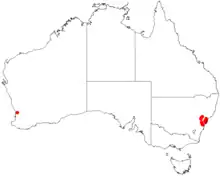| Darwinia peduncularis | |
|---|---|
 | |
| Scientific classification | |
| Kingdom: | Plantae |
| Clade: | Tracheophytes |
| Clade: | Angiosperms |
| Clade: | Eudicots |
| Clade: | Rosids |
| Order: | Myrtales |
| Family: | Myrtaceae |
| Genus: | Darwinia |
| Species: | D. peduncularis |
| Binomial name | |
| Darwinia peduncularis | |
 | |
| Occurrence data from AVH | |
Darwinia peduncularis is a species of flowering plant in the myrtle family Myrtaceae and is endemic to the Sydney region in New South Wales. It is a shrub with flattened leaves and purplish red flowers usually arranged in pairs.
Description
Darwinia peduncluaris is a broadly-spreading shrub that typically growing to a height of 1.5 m (4 ft 11 in) and has glabrous, flattened, spreading leaves 7–12 mm (0.28–0.47 in) long. Flowering occurs from late winter to early spring and the flowers usually occur in pairs on a peduncle 4–7 mm (0.16–0.28 in) long and often curved downwards. There are leaf-like, triangular bracts 1–10 mm (0.039–0.394 in) long and oblong bracteoles 4–8 mm (0.16–0.31 in) long at the base of the flowers but that fall off as the flower develops.[2][3]
Taxonomy
Darwinia peduncularis was first formally described in 1962 by Barbara G. Briggs in Contributions from the New South Wales National Herbarium from specimens she collected near Hornsby in 1958.[4]
Distribution and habitat
This darwinia grows on sandstone hillsides and ridges in dry sclerophyll forest between Hornsby, the Hawkesbury River and inland as far as Glen Davis.[3]
Conservation status
Darwinia peduncularis is listed as "vulnerable" under the New South Wales Government Biodiversity Conservation Act 2016.[2]
References
- ↑ "Darwinia peduncularis". Australian Plant Census. Retrieved 21 December 2020.
- 1 2 "Darwinia peduncularis - profile". Threatened species. New South Wales Office of Heritage and Environment. Retrieved 10 February 2017.
- 1 2 Wilson, Peter G. "Darwinia peduncularis". Royal Botanic Garden Sydney. Retrieved 21 December 2020.
- ↑ "Darwinia peduncularis". APNI. Retrieved 21 December 2020.